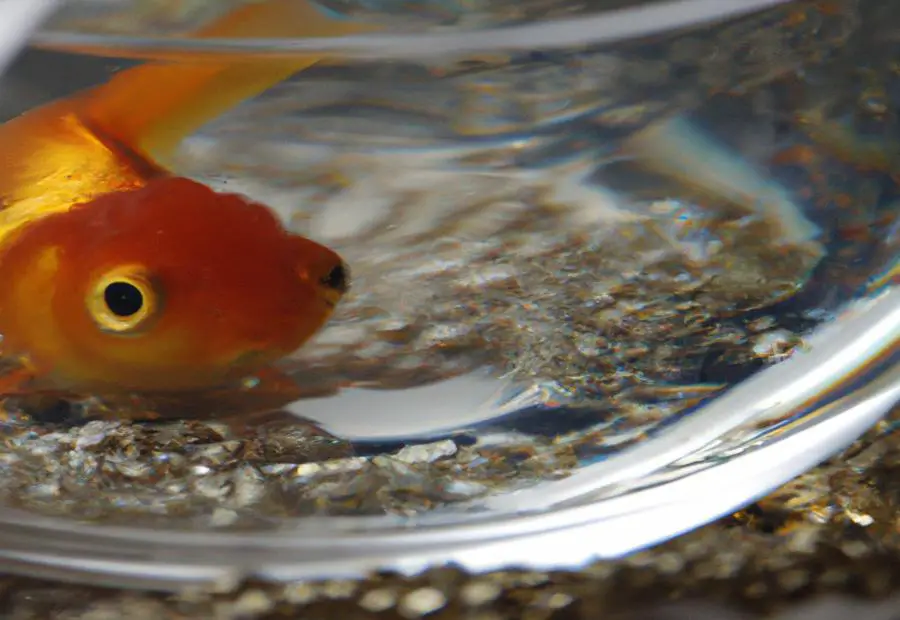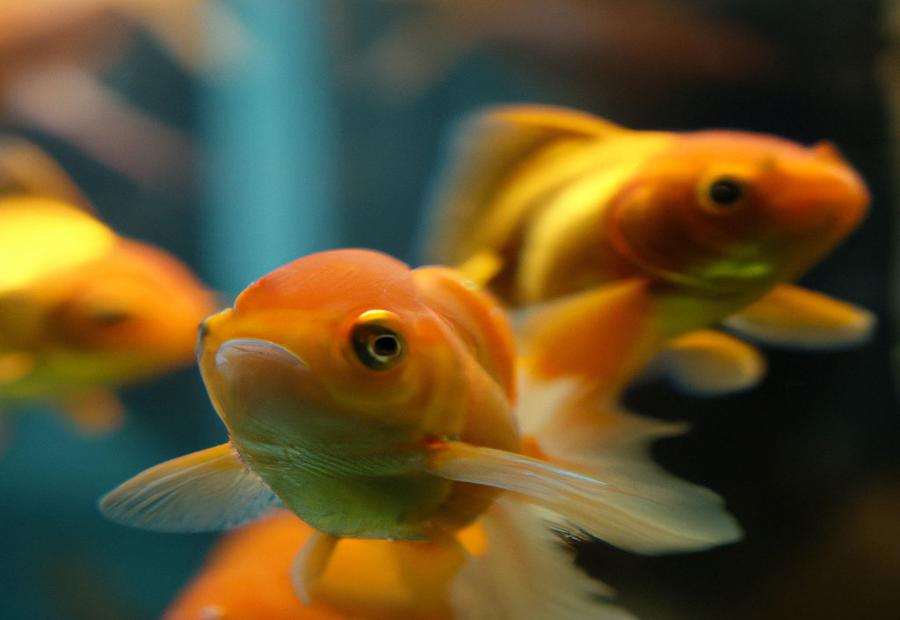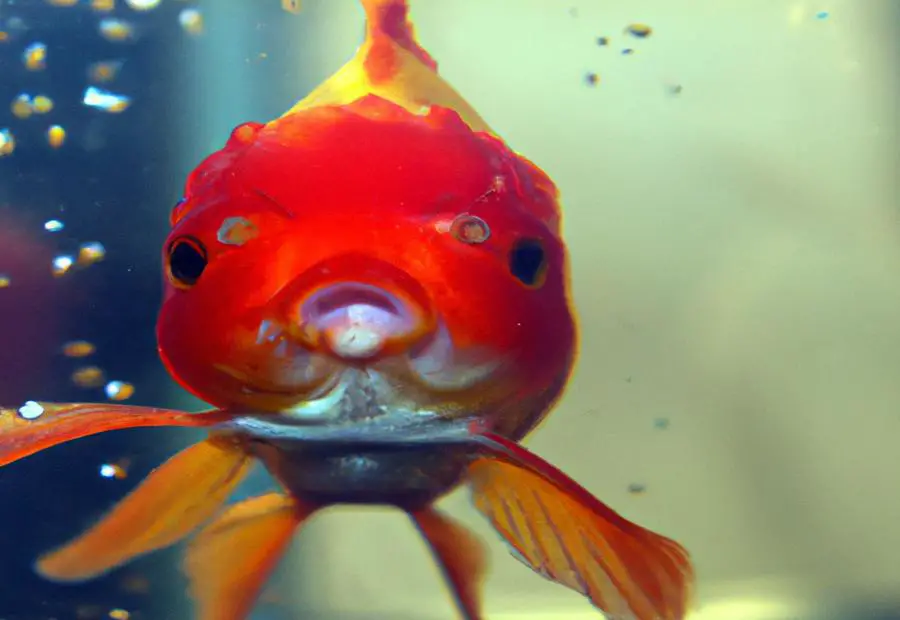Last Updated on 2 years by admin

Can a Goldfish Be Overweight?
Goldfish are popular pets known for their vibrant colors and graceful swimming. However, just like any other living creature, goldfish can also become overweight. Understanding the factors that contribute to goldfish weight, recognizing the signs of an overweight goldfish, and being aware of the health risks associated with it is essential for their well-being. A study conducted by the University of Bristol’s School of Veterinary Sciences highlights the prevalence of obesity in pet goldfish due to improper diet and inadequate living conditions.
Feeding habits and diet play a crucial role in determining the weight of a goldfish. Overfeeding or providing an unbalanced diet high in carbohydrates can lead to excessive weight gain. genetics and breed can influence a goldfish’s predisposition to weight issues. Some goldfish breeds are more prone to obesity than others.
Signs of an overweight goldfish include a rounded or bloated appearance, difficulty swimming, inability to reach the surface for food, and a decrease in overall activity level. These signs indicate an unhealthy accumulation of fat in the fish’s body.
Carrying excess weight can pose significant health risks for goldfish. Obesity can lead to decreased mobility, strain on internal organs, and a weakened immune system, making them more susceptible to diseases. It can also impact their lifespan and overall quality of life.
Preventing and managing goldfish obesity requires a holistic approach. Providing a proper diet and feeding schedule is essential. Feeding a balanced diet and avoiding overfeeding will help control weight gain. Also, ensuring that the goldfish has adequate space and a suitable tank environment is crucial for their overall well-being. Finally, encouraging regular exercise, such as placing objects in the tank for the goldfish to explore and swim around, can help them maintain a healthy weight.
If you suspect that your goldfish is overweight or if you are unsure about their weight, it is advisable to consult a veterinarian who specializes in aquatic animals. They can assess the fish’s weight, provide guidance on proper care and diet, and address any underlying health issues that may contribute to weight problems.
By understanding the factors related to goldfish weight, recognizing the signs of an overweight goldfish, and taking proactive measures to prevent and manage obesity, you can ensure the well-being of your treasured aquatic companion.
Key takeaway:
- Feeding habits and diet impact goldfish weight: Goldfish can become overweight due to overfeeding or a poor diet. Monitoring their food intake and providing a balanced diet is crucial in maintaining a healthy weight.
- Genetics and breed influence goldfish weight: Some goldfish breeds are more prone to weight gain than others. Understanding the genetics and breed characteristics can help in managing their weight effectively.
- Recognizing signs of overweight goldfish: It’s important to be aware of signs such as a bulging belly, difficulty swimming, or reduced activity levels, which may indicate that a goldfish is overweight and needs intervention.
- Health risks associated with overweight goldfish: Obesity in goldfish can lead to various health issues, including organ damage, reduced lifespan, and susceptibility to diseases. Regular monitoring and weight management are essential for their well-being.
- Preventing and managing goldfish obesity: Providing a proper diet and feeding schedule, ensuring sufficient space and tank environment, and encouraging regular exercise can help prevent and manage obesity in goldfish.
- Consulting a veterinarian for weight issues: If concerned about a goldfish’s weight, consulting a veterinarian who specializes in fish health is crucial. They can provide expert guidance and advice tailored to the specific needs of the goldfish.
Can a Goldfish Be Overweight?

Photo Credits: Bettafishworld.Com by Jesse Robinson
Yes, a goldfish can be overweight due to various factors.
- Diet: Goldfish that are overfed or given food with high fat content are more likely to become overweight. It is important to feed them a balanced diet and monitor their food intake.
- Activity level: Goldfish that do not have enough space to swim or lack stimulation may become inactive, leading to weight gain. Providing them with a suitable environment and engaging them in regular exercise can help prevent this.
- Water quality: Poor water quality can affect a goldfish’s metabolism and overall health, potentially leading to weight gain. Regular water changes and maintaining the proper pH and temperature levels are crucial.
- Genetics: Some goldfish breeds are more prone to weight gain than others. It is important to research the specific breed and understand their dietary needs and potential health risks.
- Health conditions: Certain health conditions such as swim bladder disorder or organ problems can contribute to weight gain in goldfish. Regular health check-ups and prompt treatment of any issues are essential.
Monitoring the size and weight of your goldfish is important to ensure their well-being. Maintaining a healthy diet, providing a suitable environment, and addressing any health concerns promptly can help prevent goldfish from becoming overweight.
Factors That Contribute to Goldfish Weight
When it comes to goldfish weight, several factors play a crucial role. Exploring the connection between feeding habits and diet, as well as the influence of genetics and breed, we dive into the reasons behind goldfish weight. From their voracious appetites to the genetic predispositions that determine their size, this section uncovers the intriguing elements that contribute to a goldfish’s weight. Prepare to unravel the secrets behind a goldfish’s scale-tipping physique!
1. Feeding Habits and Diet
Eating habits and diet are crucial factors to consider when it comes to the weight of a goldfish. Goldfish can easily become overweight if they are overfed or given a diet that is high in fat and carbohydrates. Proper feeding habits and a balanced diet are essential for maintaining the health of your pet.
| Feeding Habits | Diet |
| 1. Feed your goldfish small meals multiple times a day rather than one large feeding. | 1. Choose a high-quality goldfish food that is specifically formulated for their nutritional needs. |
| 2. Avoid overfeeding your goldfish as they have small stomachs and can easily overeat. | 2. Include a variety of foods in their diet such as pellets, flakes, and fresh vegetables. |
| 3. Observe their feeding behavior and adjust the amount of food accordingly. | 3. Limit the amount of treats or live foods given to prevent weight gain. |
It is important to note that goldfish should not be deprived of food, as this can lead to malnutrition. Finding the right balance between feeding habits and a nutritious diet will help prevent obesity in goldfish and promote their overall well-being.
Remember to consult with a veterinarian specialized in aquatic animals for advice tailored to your goldfish’s specific needs. Taking proactive measures in managing their feeding habits and diet will contribute to a healthy and happy goldfish.
2. Genetics and Breed
| Genetics |
| Some goldfish breeds are naturally more prone to being overweight than others. |
| For example, fancy goldfish breeds such as Orandas and Ranchus tend to have a slower metabolism and are more likely to gain weight compared to slim-bodied breeds like Comets and Shubunkins. |
Signs of an Overweight Goldfish
If you notice signs of an overweight goldfish, such as an excessively round or bloated body shape, bulging eyes, difficulty swimming or floating near the surface, labored breathing or gasping, lethargy or reduced activity levels, loss of appetite or refusing to eat, increased waste production, fin deterioration or fin rot, or swimming abnormally or tilting to one side, it is important to take action to improve your goldfish’s health.
To improve your goldfish’s health, monitor and adjust their feeding habits, ensuring they are not overeating. Provide a varied diet of high-quality goldfish pellets, vegetables, and occasional treats. Enrich their environment with toys and plants to encourage exercise. Ensure optimal water conditions with regular water changes and adequate filtration. If necessary, consult a veterinarian specializing in exotic pets for a professional assessment and advice.
Health Risks of an Overweight Goldfish
An overweight goldfish faces several health risks. Obesity in goldfish can lead to reduced mobility and stress on their internal organs. It increases the risk of developing swim bladder issues, which can affect their ability to maintain buoyancy and swim properly. Overweight goldfish are also more prone to digestive problems and constipation. These health risks can shorten their lifespan and reduce their overall quality of life.
Maintaining a healthy weight for your goldfish is crucial to ensure their well-being. Proper feeding habits, a balanced diet, and regular exercise can help prevent obesity in goldfish and minimize the associated health risks. Monitor their food intake and avoid overfeeding. Providing a varied diet of high-quality vegetable-based foods and occasional treats can keep them satisfied and healthy. Ensuring a clean and spacious environment for your goldfish to swim and explore will encourage physical activity. Regularly check their weight and body condition to assess their health. By avoiding obesity, you can enhance the longevity and well-being of your goldfish.
Preventing and Managing Goldfish Obesity

Photo Credits: Bettafishworld.Com by Ethan Jackson
Preventing and managing goldfish obesity is crucial for their overall health and well-being. In this section, we will explore effective strategies to tackle this issue. From ensuring a proper diet and feeding schedule to creating an adequate tank environment, we will uncover ways to keep your goldfish fit and healthy. Additionally, we’ll dive into the importance of regular exercise for these aquatic creatures. Let’s discover how to prevent and manage obesity in our beloved goldfish companions!
1. Proper Diet and Feeding Schedule
A proper diet and feeding schedule are essential for maintaining the optimal weight of a goldfish.
It is important to avoid overfeeding the goldfish as it can lead to weight gain and health issues.
Instead of one large meal, feed the goldfish small portions of food multiple times a day to ensure a balanced diet and proper feeding schedule.
Choose high-quality fish food that is specifically formulated for goldfish and contains the necessary nutrients to maintain a proper diet.
Avoid feeding the goldfish excessive amounts of fatty or processed foods, as they can disrupt the proper diet and feeding schedule.
Incorporate a variety of foods in the goldfish’s diet, including pellets, flakes, and fresh vegetables, to provide a well-rounded and proper diet.
Monitor the goldfish’s intake to prevent excessive consumption and adjust the feeding schedule accordingly to maintain a proper diet.
2. Providing Adequate Space and Tank Environment
When it comes to providing adequate space and a suitable tank environment for a goldfish, it is essential for their overall well-being and preventing obesity. Here are some important considerations:
- Adequate tank size: Goldfish require a spacious tank to swim and explore. The general rule of thumb is to provide 20 gallons of water per goldfish, with an additional 10 gallons for each additional fish.
- Proper filtration: A good filtration system is crucial in maintaining water quality and removing waste. This helps prevent overcrowding of harmful bacteria and reduces the risk of obesity-related health issues.
- Regular water changes: Regular partial water changes help maintain optimal water conditions and prevent the accumulation of waste and toxins. Aim for a 20-30% water change every 1-2 weeks.
- Adequate oxygen levels: Goldfish require sufficient oxygen to thrive. Ensure proper aeration and oxygenation in the tank by using air stones, pumps, or filters that create water movement.
- Appropriate tank decorations: Providing adequate hiding spots and vegetation can help reduce stress and boredom for goldfish. This can encourage natural behaviors and prevent overeating due to stress or lack of stimulation.
By following these suggestions, you can create an ideal space and tank environment for your goldfish, promoting their well-being and preventing the risk of obesity.
3. Encouraging Regular Exercise
Regular exercise is crucial for promoting and maintaining a healthy weight in goldfish. To encourage regular exercise for your goldfish, there are several effective strategies you can implement:
1. Provide a spacious tank: It is important to ensure that your goldfish have ample space to swim and move freely. Avoid confining them in a tank that is too small, as it can restrict their movement and lead to a sedentary lifestyle. Make sure to select a tank that is suitable for the size and number of goldfish you have.
2. Incorporate obstacles and toys: Enhance your goldfish’s environment by adding objects such as rocks, plants, or tunnels to the tank. These additions will create a stimulating atmosphere, encouraging your goldfish to swim around, explore, and exercise their muscles.
3. Utilize a bubble wand or air stone: Installing a bubble wand or air stone in the tank can generate currents and bubbles, which will not only provide visual interest but also stimulate the goldfish to swim against the flow. This resistance aids in building muscle strength.
4. Vary tank decorations: To keep things fresh and exciting for your goldfish, periodically rearrange or change the decorations in the tank. This will give the environment a rejuvenated feel and motivate your goldfish to actively swim around and explore their surroundings.
5. Introduce interactive foods: Instead of simply dropping food flakes or pellets into the tank, consider offering interactive foods such as freeze-dried or live insects. This will prompt your goldfish to chase their food, promoting activity and exercise.
Pro-tip: While encouraging exercise, it is essential to closely monitor your goldfish to ensure they do not become stressed or overexerted. Consistent exercise, in conjunction with a balanced diet and feeding schedule, is key to maintaining a healthy weight for your goldfish.
Consulting a Veterinarian for Goldfish Weight Issues

Photo Credits: Bettafishworld.Com by Jesse Miller
Consulting a Veterinarian for Goldfish Weight Issues is essential to ensure the well-being of your pet. If you observe that your goldfish is overweight, it is crucial to seek professional advice in order to address this matter. Veterinarians possess the necessary expertise to evaluate the weight of your goldfish and determine whether it falls within a healthy range. They can offer guidance on proper feeding habits and suggest a balanced diet that will help your goldfish maintain a healthy weight. Moreover, a veterinarian is capable of examining your goldfish for any underlying health conditions that might contribute to its weight gain. By regularly consulting a veterinarian, you can prevent and manage weight issues in your goldfish, thereby ensuring its overall health and longevity.
Some Facts About Can a Goldfish be Overweight:
- ✅ Overfeeding can cause a goldfish to become overweight. (Source: fishparenting.com)
- ✅ Dropsy, a condition where the kidneys fail to remove excess water, can make a goldfish appear extremely fat. (Source: fishparenting.com)
- ✅ Stress, poor water quality, and imbalances in lighting and temperature can contribute to the development of dropsy and obesity in goldfish. (Source: fishparenting.com)
- ✅ Goldfish with dropsy may exhibit symptoms such as a bloated appearance, loose scales, and an extended abdomen. (Source: fishparenting.com)
- ✅ Proper care, early diagnosis, and treatment can help a goldfish recover from dropsy and obesity. (Source: fishparenting.com)
Frequently Asked Questions
Can a goldfish be overweight?
Yes, a goldfish can appear overweight or bloated due to various reasons such as overfeeding, improper diet, or digestive issues. It is important to provide a balanced diet and monitor their food intake to prevent obesity in goldfish.
Can swim bladder disease affect a goldfish’s size?
Swim bladder disease can cause swimming problems in goldfish, but it does not directly affect their size. However, if a goldfish’s swim bladder is compromised, it may lead to issues with buoyancy and affect their ability to eat and swim properly.
Can a rapid drop in temperature lead to dropsy in goldfish?
A rapid drop in temperature can be stressful for goldfish and may contribute to the development of dropsy. It is important to maintain a stable and suitable temperature range for goldfish to prevent such situational phenomena.
What are some dropsy prevention measures for goldfish?
To prevent dropsy in goldfish, it is important to maintain a clean tank with appropriate water quality, avoid overfeeding, provide a balanced diet with higher quality fish food, and avoid overcrowding. Regular monitoring of water parameters and early diagnosis of any health issues are also key prevention measures.
Are dropsy symptoms in goldfish contagious to other fish?
Dropsy itself is not contagious among fish. However, poor water conditions that contribute to dropsy can affect multiple fish in the same environment. It is important to isolate and treat any fish showing symptoms of dropsy to prevent further complications and spread of diseases.
What are some common dropsy treatment methods for goldfish?
Treating dropsy in goldfish involves setting up a quarantine tank with slightly warmer water, adding aquarium salt, and using anti-bacterial medication. Care should be taken to monitor water quality and temperature, and the fish should be kept in the quarantine tank until all symptoms have disappeared.
